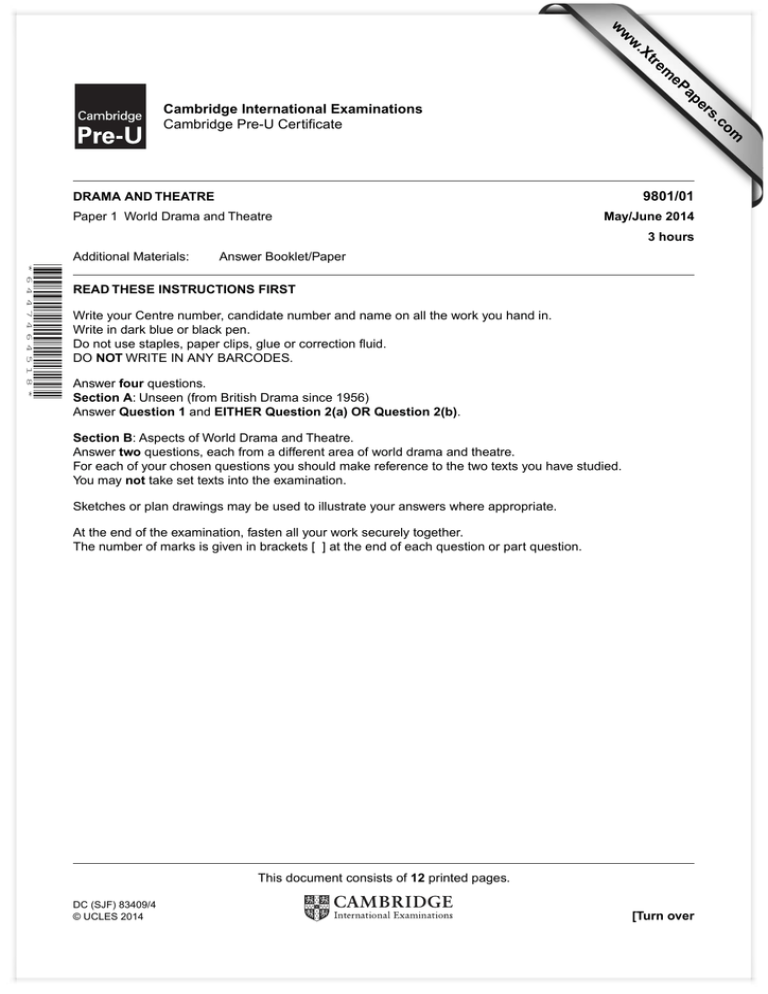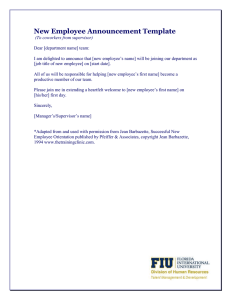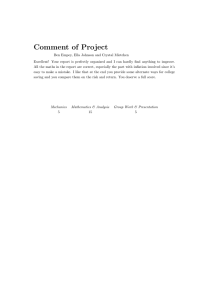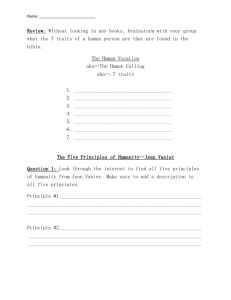www.XtremePapers.com Cambridge International Examinations 9801/01 Cambridge Pre-U Certificate
advertisement

w w ap eP m e tr .X w om .c s er Cambridge International Examinations Cambridge Pre-U Certificate 9801/01 DRAMA AND THEATRE Paper 1 World Drama and Theatre May/June 2014 3 hours Additional Materials: Answer Booklet/Paper * 6 4 4 7 4 6 4 5 1 8 * READ THESE INSTRUCTIONS FIRST Write your Centre number, candidate number and name on all the work you hand in. Write in dark blue or black pen. Do not use staples, paper clips, glue or correction fluid. DO NOT WRITE IN ANY BARCODES. Answer four questions. Section A: Unseen (from British Drama since 1956) Answer Question 1 and EITHER Question 2(a) OR Question 2(b). Section B: Aspects of World Drama and Theatre. Answer two questions, each from a different area of world drama and theatre. For each of your chosen questions you should make reference to the two texts you have studied. You may not take set texts into the examination. Sketches or plan drawings may be used to illustrate your answers where appropriate. At the end of the examination, fasten all your work securely together. The number of marks is given in brackets [ ] at the end of each question or part question. This document consists of 12 printed pages. DC (SJF) 83409/4 © UCLES 2014 [Turn over 2 Section A: Unseen (from British Drama since 1956) The following extract is the opening of After Mrs Rochester, by Polly Teale (first performed in 2003). The play is about the troubled writer Jean Rhys (JEAN), shown here living in rural isolation in Devon in the 1950s, and being visited by her DAUGHTER. After Mrs Rochester is a ‘literary memory play’, which leads its audience to the places of Jean Rhys’s imagination and childhood memories, from which the other characters in the extract come. BERTHA (the ‘Mrs Rochester’ of the play’s title, onstage throughout) is a character from Charlotte Brontë’s novel Jane Eyre (1847) – the archetypal ‘mad wife kept locked in an attic’ by her English husband. Jean Rhys identified strongly with Bertha (and re-wrote her life in the novel Wide Sargasso Sea): both were ‘white Creoles’ (mixed race) from the West Indies, and daughters of plantation owners. In the extract Bertha is dressed in stained Victorian undergarments, with matted hair. The conditions of her attic confinement have given her an ‘animal quality’. ELLA (who appears from Jean’s memory) is Jean Rhys’s younger self in the West Indies, and has her childhood name. The black girl TITE is her friend there. Ella/Jean’s MOTHER and their West Indian servant META also appear. All the characters act and interact in the same theatrical space: JEAN’s locked room. The result is a dramatic and psychological fusion of the present with memory and ‘madness’. Read the extract carefully, and then answer the questions that follow it. Make certain that your answers are entirely relevant to the extract. Characters in the extract: (In Devon) JEAN – Jean Rhys in later life DAUGHTER – her adult daughter (From Jane Eyre) BERTHA – the ‘mad Mrs Rochester’ (From West Indian memory) ELLA – Jean Rhys’s younger self MOTHER – Ella/Jean’s mother TITE – Ella/Jean’s friend META – a servant © UCLES 2014 9801/01/M/J/14 3 After Mrs Rochester ACT ONE 1957. A house in the remote Devon countryside late at night. JEAN RHYS’s bed/living/writing room. There is a large wardrobe containing clothes. The floor is littered with suitcases and boxes. Papers and manuscripts spill onto the floor. BERTHA is lying on the ground asleep. JEAN is sitting close to her. Although JEAN is made up and dressed up there is a drunken dishevelled look about her. She has a glass of wine in her hand. She is trying to write. She speaks the following lines to herself, struggling to form the sentence. JEAN Standing by the river looking at the stepping stones. The round unsteady stone. The pointed, the safe one where you stand and look around. The next one not so safe, not so safe. 5 10 We become aware of the sound of someone knocking at the front door and calling and then finally the sound of the front door opening. With each sound BERTHA stirs in her sleep and murmurs. JEAN checks herself in the mirror. Tidies her hair. She is agitated. 15 A voice, JEAN’s DAUGHTER, is heard from the other side of the door. She is dripping wet. DAUGHTER Mother. Are you there? The sound of the DAUGHTER trying the handle to the room. It is locked. She calls. 20 Mother! JEAN I wasn’t expecting … DAUGHTER Mother, are you all right? Open the door. JEAN Just a moment. JEAN checks herself again in the mirror. She stands nervously but doesn’t walk towards the door. Meanwhile. DAUGHTER Didn’t you hear me outside? I’ve been knocking for ages. I had to find the key to the front door under the stone in the dark. I thought something must have – JEAN You’re early. DAUGHTER Six o’clock. That’s what I said in my telegram. I’m late. JEAN Saturday you said. DAUGHTER It is Saturday. The boat was delayed. Storms. I missed my train at Paddington. Then I couldn’t get a taxi at the station. 25 30 BERTHA stirs. She has been disturbed by the noise. She utters something inaudible. JEAN looks at her panic-stricken. 35 What did you say? JEAN I’m … DAUGHTER What? JEAN I’m … DAUGHTER Open the door. 40 BERTHA mutters and rolls over. JEAN © UCLES 2014 Busy. 9801/01/M/J/14 [Turn over 4 Pause. DAUGHTER What are you doing? JEAN I’ll tell you later. DAUGHTER Later? JEAN Tomorrow. You said you were coming tomorrow. DAUGHTER I said I was coming on Saturday. JEAN (suddenly ) You turn up out of nowhere. Banging on my door in the middle of the night. Shouting. Letting yourself in uninvited. 45 DAUGHTER I was invited. You said come as soon as you – JEAN (as BERTHA stirs and mutters ). Who do you think you are? Never here when you’re needed. Never. 50 Silence. 55 DAUGHTER I’m going to bed. JEAN (quieter ) Tomorrow. DAUGHTER I’ve been travelling for two days. I’m so tired I can hardly stand. I’ll see you in the morning. JEAN I’m sorry. DAUGHTER Sorry. Yes. That’s right. So am I. BERTHA (half audible) Round stone not so safe, even when it dry it show slippery, even when it dry it show slippery. Slippery. DAUGHTER What did you say? JEAN Good night. DAUGHTER Good night. 60 65 The next day. A tiny sliver of sunlight shines into the darkened room through a crack in the closed curtains. JEAN and BERTHA are asleep on the floor. There is a knock on the door. JEAN Hello. DAUGHTER I’ve brought you breakfast. JEAN What? DAUGHTER Breakfast. You need to start eating properly. JEAN You … can’t have. There’s nothing in the fridge. DAUGHTER I went to the village. The woman in the shop said she hadn’t seen you for weeks. JEAN No. I’ve been … DAUGHTER What? JEAN Busy. DAUGHTER Will you open the door. JEAN Writing. 70 75 80 JEAN looks at BERTHA asleep. BERTHA rolls and murmurs. DAUGHTER What’s that? BERTHA (half audible ). Dream of escaping. In my dream I know. The passages never lead anywhere. Doors will always be shut. I know because I’ve been there before. © UCLES 2014 9801/01/M/J/14 85 5 DAUGHTER I can’t hear you. BERTHA Passages never lead anywhere. Doors shut. Been there before. DAUGHTER What? BERTHA Been there before. JEAN (to BERTHA) Be quiet. DAUGHTER Mother. JEAN Not now. Later. DAUGHTER What? JEAN I’ve told you I’m working. Got a deadline. The new book. DAUGHTER I’ve travelled hundreds of miles to see you. Came because you said you were desperate to see me. You said come as soon as you can. So I drop everything. Nearly kill myself to get here because I’m worried sick you’re going to do something … 90 95 DAUGHTER throws the tray of food to the ground. 100 Open the door for Christ sake. JEAN I CAN’T. Silence. DAUGHTER Why? JEAN Why? DAUGHTER Why … can’t … you … open … the door? JEAN Why? DAUGHTER If you don’t open the door I’m going to leave. JEAN Because … DAUGHTER Did you hear me? 105 JEAN’s MOTHER enters the room dragging ELLA, JEAN’s younger self. She beats her. They both wear Victorian clothes. ELLA is left alone stifling her tears as JEAN looks on. After a while ELLA becomes aware of JEAN watching her. JEAN What are you doing here? ELLA Go away. JEAN I can’t. ELLA Leave me alone. JEAN I’m trying to remember … ELLA Remember what? JEAN (gradually ) Remember ... who I was when they still called me Ella. Remember … why … (She picks up the cane that her MOTHER used to beat her with.) It’s what her parents … What my grandparents, your grandparents used to do to her. What they did to the slaves. 110 115 ELLA Why? JEAN Because … because they were afraid. Imagine living thousands of miles from home on a tiny West Indian island. Imagine twenty thousand people and only one hundred of them white. It was terrifying. 120 125 A young black girl, TITE, appears. She is dressed in a shabby colourful cotton dress much repaired and washed. She has bare arms and legs. She swipes a book from ELLA’s hands. TITE © UCLES 2014 You want me to take you somewhere you never been before? 9801/01/M/J/14 130 [Turn over 6 ELLA Where? TITE Yes or no? ELLA Give me my book back. TITE withholds book making ELLA jump for it. 135 Yes or no? Silence. ELLA looks at JEAN, who nods. Yes. TITE drops the book. She runs. ELLA follows. They use the furniture of the room like a landscape. ELLA watches TITE with delight. JEAN 140 I was not allowed to play with Tite. She could peel a mango with her teeth. Fires always lit for her. Sharp stones didn’t hurt her feet. She would laugh like crazy. I never once saw her cry. The sound of rushing water. TITE and ELLA sit with their feet in the river. TITE is stripping a stick with a knife. TITE I dare you. I dare you swim to the bottom like you say you can. Right down to the bottom. Pick up a stone and bring it back. ELLA I can. TITE I ain’t never seen you. ELLA So. TITE Prove it. ELLA Don’t have to prove anything. TITE You scared. ELLA I’m not. TITE Bet you can’t. Bet you my pen knife. Bet you my knife and this stick and my new dress and a penny and … ELLA I bet you every penny in my purse. 145 150 155 ELLA takes off her dress ready to plunge into the water as JEAN speaks. JEAN Whenever I could escape the house I would follow Tite down to the river to swim. Past the abandoned sugar works. Into the rain forest. Where there was no road. No path. No track. Over the stepping stones. The trees grew wild there. The smell was heavy sweet and very strong. You could smell them a long way off. Huge rotting flowers drop into the water. The smell of decay, of death, and a fresh living smell. ELLA surfaces coughing and spluttering. TITE is laughing. ELLA I did it. TITE You never. ELLA I did. TITE You look like you drown dead. You look like you drink half the river. TITE takes the money from ELLA’s purse and tosses the empty purse to the ground. ELLA Cheat. TITE Show me the stone. ELLA I dropped it. TITE Liar. © UCLES 2014 160 165 170 175 9801/01/M/J/14 7 ELLA Keep them. I can get more if I want. Cheat! ELLA takes TITE’s stick. TITE That’s not what me hear. Me hear you all poor like beggar. That old house so leaky you run with a calabash every time it rain. The garden grow wild like the forest. Won’t nobody come look after it. Them say it haunted. ELLA Liar. You’re a liar. TITE You eat salt fish. No money for fresh fish. You got holes in your shoes. I seen them when you take them off to swim. ELLA My grandfather owned Geneva plantation. He had two hundred and fifty-eight slaves. TITE And two hundred fifty-eight children. ELLA My mother had two brothers and two sisters. TITE That ain’t what me heard. Me hear half the village your mammy’s brother and sister. You look closer. See how everyone look alike round here. 180 185 190 ELLA shoves TITE backwards. A fight begins. ELLA Shut up. TITE Real white people got gold money. They don’t come near you. They don’t even look at you. TITE climbs off ELLA. She takes off her dress and flings it at ELLA. She takes ELLA’s dress as well as the money and leaves. 195 ELLA gets slowly to her feet. She puts on TITE’s dress. She finds TITE’s stick lying on the ground and takes it. ELLA/JEAN’s MOTHER grabs ELLA by the arm and drags her into the kitchen where META, their servant, is drying her hands. 200 ELLA I told you. I lost it. MOTHER (furious ). Lost! …You LOST your dress. (To META.) Meta, find her a clean dress. Throw away that thing. Burn it. META Ain’t no clean dress. She was wearing her clean dress. MOTHER Don’t talk nonsense. META She got two dresses. Wash and wear. You want new dress drop from heaven. MOTHER Be quiet. META You want come look in the wardrobe. (Under her breath.) Some people crazy in truth. MOTHER (to ELLA). You will go to your room and you will not leave until tomorrow when you will be clean and properly dressed. Do you understand? 205 210 Silence. ELLA stares back at her MOTHER, defiant. Do you understand? JEAN That night my mother beat me so hard I couldn’t breathe. META enters. Meta is rough with me in the bath saying I make trouble for her. But after, when she brushes my hair she forgets about me and sings to herself. I try not to move in case I bring her back to her senses and she tells me off again. 215 META strokes ELLA’s hair and sings a West Indian song. She leaves her asleep. © UCLES 2014 9801/01/M/J/14 [Turn over 8 Answer Question 1 and EITHER Question 2(a) OR Question 2(b). 1 As a director, outline how you would stage the different ‘realities’ of time and place presented in the extract. [10] AND EITHER 2 (a) As a designer, how would you use both lighting and sound to shape the mood and atmosphere in performance? You should refer to specific moments in the extract. [20] OR 2 (b) As an actor playing the role of JEAN, how would you use vocal and physical skills to establish the character’s situation in her external and internal worlds of existence? [20] © UCLES 2014 9801/01/M/J/14 9 Section B: Aspects of World Drama and Theatre Answer two questions, each from a different area of world drama and theatre. For each of your chosen questions you should make reference to the two texts you have studied. Foundations of Modern Drama Anton Chekhov: The Seagull Henrik Ibsen: Hedda Gabler George Bernard Shaw: Saint Joan Oscar Wilde: The Importance of Being Earnest If you choose to answer from this area of study, answer one question. 3 With close reference to one leading role from each of two plays you have studied, discuss the rehearsal techniques that an actor might use to find the truth/authenticity on which to base their characterisation. [25] 4 How could a theatre company use visual elements to present illusions of real life? Refer to specific moments/scenes from two plays you have studied. [25] 5 How might productions of two plays you have studied highlight cultural tensions in the societies presented? [25] © UCLES 2014 9801/01/M/J/14 [Turn over 10 Political Theatre Bertolt Brecht: The Resistible Rise of Arturo Ui Caryl Churchill: Cloud Nine Kee Thuan Chye: 1984 Here & Now Tony Kushner: Angels in America If you choose to answer from this area of study, answer one question. 6 Compare how two political plays you have studied present distinctive images of society and indicate how these might be realised in performance. [25] 7 ‘The message is too often more important than the characterisation.’ How far is this a valid criticism of two political plays you have studied? You should focus on the presentation of specific characters and moments in your response. [25] 8 Using specific examples from two political plays you have studied, explain how sound and visual elements might combine to shape an audience’s understanding of the themes of the plays. [25] © UCLES 2014 9801/01/M/J/14 11 African Drama Ama Ata Aidoo: The Dilemma of a Ghost Athol Fugard: My Children! My Africa! Percy Mtwa, Mbongeni Ngema and Barney Simon: Woza Albert! Wole Soyinka: The Lion and the Jewel If you choose to answer from this area of study, answer one question. 9 Compare and contrast the performance skills needed to convey different types of conflict in two African plays you have studied. You should refer to two particular scenes or episodes of conflict from each play. [25] 10 How might set and lighting design be used to engage an audience in two African plays you have studied? You should refer to specific moments and their potential effects in your response. [25] 11 ‘The heart of African drama is storytelling.’ With close reference to two African plays you have studied, discuss how storytelling devices contribute to the overall effect of the drama. [25] © UCLES 2014 9801/01/M/J/14 [Turn over 12 Jacobean Tragedy Thomas Heywood: A Woman Killed with Kindness Cyril Tourneur (or Thomas Middleton): The Revenger’s Tragedy John Webster: The Duchess of Malfi Thomas Middleton and William Rowley: The Changeling If you choose to answer from this area of study, answer one question. 12 As an actor, what performance techniques would you use to convey attitudes towards chastity and desire in two Jacobean plays you have studied? You should refer to specific moments or episodes from each play. [25] 13 With close reference to selected scenes from two Jacobean plays you have studied, identify key elements of stagecraft that provide clues to staging in the original performance conditions. [25] 14 How might the performance of Jacobean tragedy successfully bring out the most significant themes for a twenty-first-century audience? Refer to specific examples from two plays you have studied. [25] Copyright Acknowledgements: Section A © Polly Teale; After Mrs Rochester ; Nick Hern Books; 2003. Permission to reproduce items where third-party owned material protected by copyright is included has been sought and cleared where possible. Every reasonable effort has been made by the publisher (UCLES) to trace copyright holders, but if any items requiring clearance have unwittingly been included, the publisher will be pleased to make amends at the earliest possible opportunity. Cambridge International Examinations is part of the Cambridge Assessment Group. Cambridge Assessment is the brand name of University of Cambridge Local Examinations Syndicate (UCLES), which is itself a department of the University of Cambridge. © UCLES 2014 9801/01/M/J/14



